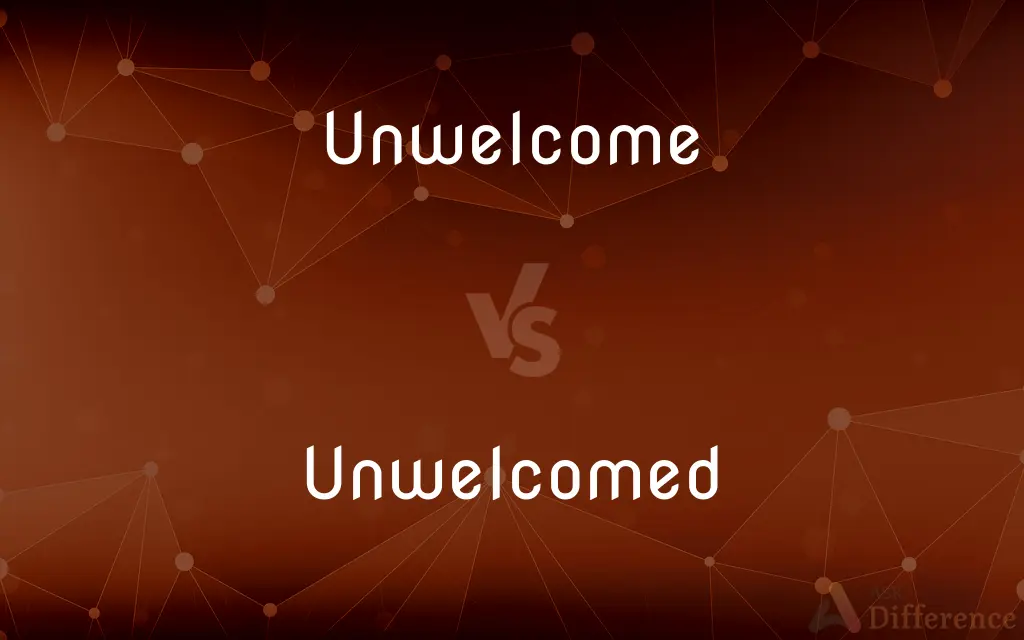Unwelcome vs. Unwelcomed — What's the Difference?
By Fiza Rafique & Urooj Arif — Updated on March 10, 2024
"Unwelcome" refers to not being received with pleasure or approval, often used as an adjective, whereas "unwelcomed" is the past participle of "unwelcome," typically used to describe something or someone that has not been received warmly.

Difference Between Unwelcome and Unwelcomed
Table of Contents
ADVERTISEMENT
Key Differences
"Unwelcome" is primarily used as an adjective to describe something or someone that is not wanted or not received with pleasure. It indicates a lack of invitation or approval by others. For instance, an unwelcome guest is someone who shows up without being wanted. Whereas "unwelcomed," being the past participle form, is often used in more specific contexts where the action of being unwelcome is completed or emphasized in the past. It conveys that something or someone was actively not welcomed.
Describing feelings or reactions, "unwelcome" can be used broadly to express the general sentiment of displeasure or non-acceptance. For example, expressing that a suggestion was unwelcome implies it was not appreciated or desired at the time it was offered. On the other hand, "unwelcomed" might be used in a narrative or descriptive context to emphasize that an action was taken (or not taken) in response to someone's presence or suggestion, often highlighting the response's completion or effect.
In terms of usage, "unwelcome" is more commonly used than "unwelcomed." This is because the adjective form directly describes the state of being not wanted, fitting smoothly into a wide range of sentences and contexts. Meanwhile, "unwelcomed" is less common and is typically reserved for instances where there's a clear action or decision to not welcome, often requiring a more specific narrative context to make sense.
The choice between "unwelcome" and "unwelcomed" can also reflect subtle nuances in tone and focus. Using "unwelcome" focuses on the state or condition of being not wanted or accepted, which can be more impersonal or general. Conversely, "unwelcomed" might imply a more specific action taken against someone or something, potentially carrying a slightly more active or deliberate tone.
Both terms, while closely related, serve to communicate different aspects of rejection or non-acceptance. "Unwelcome" is versatile and widely applicable across contexts to express a general sense of being not desired. "Unwelcomed," though grammatically specific, offers a nuanced way to highlight the act or process of rejecting or not welcoming someone or something, often bringing a temporal or narrative dimension to the sentiment expressed.
ADVERTISEMENT
Comparison Chart
Part of Speech
Adjective
Past participle/Adjective
Usage
Describes something not wanted or accepted
Describes the action of not welcoming
Common Contexts
General sentiment, broader usage
Specific instances, narrative context
Example Usage
"An unwelcome opinion"
"They felt unwelcomed at the party"
Nuance
Implies a state of being
Implies an action or process
Frequency of Use
More common
Less common
Focus
On the state or condition
On the act of not welcoming, with a temporal aspect
Narrative Dimension
Less specific, more general
More specific, often used in past narratives
Tone
Can be impersonal or general
May carry an active or deliberate tone
Compare with Definitions
Unwelcome
Not received with pleasure or approval.
Unwelcome advice often causes more harm than good.
Unwelcomed
Describing a past instance of being rejected or not received warmly.
The proposal was unwelcomed, leading to its eventual dismissal.
Unwelcome
Not desired or wanted in a particular situation.
His advances were clearly unwelcome.
Unwelcomed
Often used to convey a sense of not belonging.
As an outsider, he felt distinctly unwelcomed in the tight-knit community.
Unwelcome
Reflecting a general sentiment of rejection.
Feeling unwelcome, she decided to leave early.
Unwelcomed
Emphasizing the completion of a rejection process.
Unwelcomed suggestions were quickly set aside during the meeting.
Unwelcome
Pertaining to an unpleasant or undesirable presence or occurrence.
The unwelcome news cast a shadow over the evening.
Unwelcomed
Relating to an explicit action of not welcoming.
The unwelcomed interruption disrupted the flow of the discussion.
Unwelcome
Indicating the absence of an invitation or acceptance.
Unwelcome guests can make for an awkward situation.
Unwelcomed
Having been actively not welcomed or accepted.
They felt unwelcomed by the cold reception at the new club.
Unwelcome
Unwelcome is the fifth studio album by the Death Metal band Arsis. It was released on April 30, 2013 through Nuclear Blast Records.
Unwelcomed
Not having been welcomed.
Unwelcome
(of a guest or new arrival) not gladly received
Guards kept out unwelcome visitors
Unwelcome
Not received with pleasure into one's company or home
An unwelcome guest.
Unwelcome
Unwanted or disagreeable
Was offended by his unwelcome attentions.
Unwelcome
Not welcome.
Unwelcome
To treat as unwelcome.
Unwelcome
Not welcome; not giving pleasure or received with pleasure;
Unwelcome publicity
Unwelcome interruptions
Unwelcome visitors
Unwelcome
Not welcome;
Unwelcome publicity
Common Curiosities
How do "unwelcome" and "unwelcomed" affect the tone of a sentence?
"Unwelcome" generally describes a state or condition and can be more impersonal, while "unwelcomed" implies a more specific action or decision, potentially carrying a more deliberate tone.
What is the main difference between "unwelcome" and "unwelcomed"?
"Unwelcome" is an adjective describing something not wanted, while "unwelcomed" specifically refers to the act of not being welcomed, often used in a past or narrative context.
Can "unwelcome" be used in any context?
"Unwelcome" is versatile and can be used in a wide range of contexts to describe anything that is not received with pleasure or approval.
Can "unwelcome" describe feelings as well as actions?
Yes, "unwelcome" can describe feelings of being not wanted or accepted, as well as actions or presences that are not received with approval.
How does the use of "unwelcomed" affect the narrative of a story or description?
Using "unwelcomed" can add depth to a narrative by emphasizing the action or process of not welcoming, often adding a layer of temporal or emotional detail.
Can "unwelcomed" be used in the same way as "unwelcome"?
While related, "unwelcomed" is typically used to describe a past action of not welcoming, making it less interchangeable with the broader adjective "unwelcome."
Do "unwelcome" and "unwelcomed" convey the same level of rejection?
Both convey rejection, but "unwelcomed" can imply a more explicit action of not welcoming, whereas "unwelcome" describes a general state of being not wanted.
Is it common to see "unwelcomed" in everyday language?
"Unwelcomed" is less common in everyday language compared to "unwelcome" and is typically used in more common cases.
Is "unwelcomed" grammatically correct?
Yes, "unwelcomed" is grammatically correct, primarily used as a past participle or adjective in specific contexts to describe the action of not welcoming.
Why might someone choose to use "unwelcomed" over "unwelcome"?
Someone might choose "unwelcomed" to emphasize the action of not welcoming or to highlight a past instance of rejection, providing a temporal or narrative specificity to the sentiment.
Share Your Discovery

Previous Comparison
Etiology vs. Aetiology
Next Comparison
Write vs. PrintAuthor Spotlight
Written by
Fiza RafiqueFiza Rafique is a skilled content writer at AskDifference.com, where she meticulously refines and enhances written pieces. Drawing from her vast editorial expertise, Fiza ensures clarity, accuracy, and precision in every article. Passionate about language, she continually seeks to elevate the quality of content for readers worldwide.
Co-written by
Urooj ArifUrooj is a skilled content writer at Ask Difference, known for her exceptional ability to simplify complex topics into engaging and informative content. With a passion for research and a flair for clear, concise writing, she consistently delivers articles that resonate with our diverse audience.














































